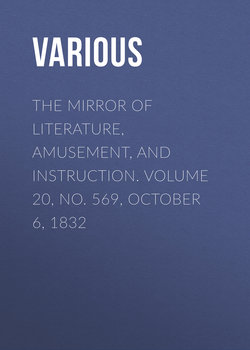Читать книгу The Mirror of Literature, Amusement, and Instruction. Volume 20, No. 569, October 6, 1832 - Various - Страница 3
MANNERS AND CUSTOMS
ОглавлениеMARVELLOUS CURE OF THE TOOTHACH
(From a Correspondent.)
A friend, who has recently returned from India, relates that he received a perfect cure for the toothach, in a very remarkable way. He had occasion to land on the Isle of Bourbon, at the time of his being afflicted with a tormenting toothach; and a handkerchief being tied about his head, his appearance excited the curiosity of the natives, who approached him, and inquired, by signs and gestures, the nature of his complaint. Having been satisfied on this point, they made him understand that they could cure him, if he would consent to their method; which he did with great willingness, as he was maddened with pain, and eager to make any experiment to gain relief. They first kindled a fire on the ground with a few dry sticks, and then directed their patient to hold the fore finger of his right hand to the tooth that was affected, while they articulated a sort of jargon among themselves. When they had finished, and the sticks were all burnt, they told him to withdraw his hand, and the pain would cease. He did so, when his joy and astonishment exceeded all bounds to find that the pain had actually left him!
This story may appear somewhat strange, yet I have no reason to doubt the veracity of my friend, who supposes that the artful natives burned some kind of herb in order to impregnate the air with its qualities, which being admitted into the cavity of the tooth, effectually removed the pain. He says he has never experienced a return of the complaint since.
G.W.N.
JOURNAL OF A SHERIFF OF LONDON
(Concluded from page 198.)
"Wednesday, Oct. 29th. This being our grand feast day, my Lord Mayor, Humphry Parsons, Esq., sent his summons to attend at Guildhall, by ten o'clock, and that he would set out from thence, to Westminster, precisely at eleven, in order to be back to our entertainment more early. What added magnificence to this day's Shew was, that his lordship's coach was drawn by six horses, adorned with grand harnesses, ribbons, &c., a sight never before seen on this occasion.—The Lord Chancellor and some of the Judges dined with us; the whole entertainment was happily conducted with great order and decency, and the company was broken up by about one o'clock in the morning.
"Wednesday, Nov. 5th. This being the commemoration of the Gunpowder Plot, we, the sheriff's, attended my Lord Mayor from Guildhall to St. Paul's: and as his lordship's coach was, on this occasion, drawn as before by six horses, which he intended to do on every public occasion, it caused a more than ordinary concourse of people in the streets."
On Sunday, the 11th of January, Mr. Hoare, in his scarlet gown, with the Lord Mayor, and several of the aldermen, received the holy communion, in St. Lawrence's church, in pursuance of the statutes, to qualify themselves to act as magistrates; and on the following day, being Plough Monday, he attended the Lord Mayor at Guildhall, "to receive the several presentments of the respective wardmote inquests of each ward,—and at the same time to swear in all new constables for the ensuing year." On Wednesday, the 14th the quarter sessions commenced, "when it is usual for the several common councilmen to take the oaths of allegiance;" which was done accordingly.
"Friday, February 20th. Waited on my Lord Mayor to Bow church, in my scarlet, to hear a sermon upon the propagation of the gospel in foreign parts; to which the Archbishop of Canterbury also came in his state coach, and with grand solemnity, attended by seven or eight bishops, and great numbers of gentlemen of that society."
The Lord Mayor (Humphry Parsons) died on the evening of March the 21st, 1741; on the 23rd, Daniel Lambert, Esq. was elected to succeed him, and the same evening he was presented to the Lord Chancellor, and approved of in the usual manner.
"Wednesday, March 15th. This day the new Lord Mayor went in grand state and procession by land to the Tower-gate, on Tower-hill, to be there presented to and sworn in before the Constable of the Tower, according to the charter and ancient custom and usage when a Lord Mayor happened, as in this case, to be chosen out of term time; and, consequently, cannot be presented to the Barons of the Exchequer sitting at Westminster. Just at the entrance of the Tower-gate, a large booth was built up, with seats and benches at the upper end, in the middle of which the right honourable Lord Cornwallis, Constable of the Tower, was seated, attended by the officers and servants belonging to him; to whom the Lord Mayor was conducted and presented, and sworn in the same manner as before the Barons of the Exchequer."
On the 28th of March, being Easter Eve, the sheriff's attended the Lord Mayor "through the streets, to collect charity for the prisoners in the city prisons, according to annual custom;" and on the Monday following, they accompanied his lordship, in procession, with the rest of the court of aldermen to St. Bride's church to hear the 'Spital
